BANK OF ALBANIA
PRESS RELEASE
Speech by Governor Sejko, at the Hearing of the Committee on Economy and Finance of the Albanian Parliament, on non-bank financial institutions which purchase non-performing loans
Publication date: 21.05.2024
Honourable Chair,
Honourable members of the Parliament,
Article 161 of the Constitution of the Republic of Albania defines the Bank of Albania as the constitutional institution, charged with two main tasks: the implementation of monetary policy and the issuance of domestic currency.
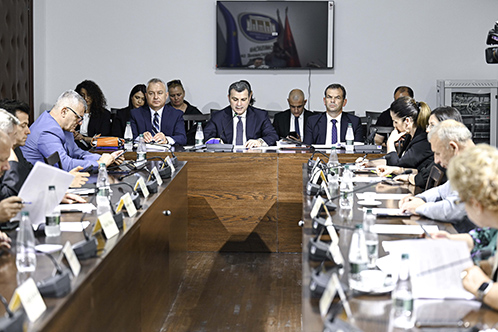
In accordance with this provision, the organic function of the Bank of Albania is regulated by special laws, as well as the duties and functions that the legislator has assigned to the Bank of Albania. We are quoting these laws below:
- Law No. 8269, dated 23.12.1997, “On the Bank of Albania”, as amended;
- Law No. 9662, dated 18.12.2006, “On banks in the Republic of Albania”, as amended;
- Law No. 133, dated 29.04.2013, “On payment system”;
- Law No. 55/2020 “On payment services”;
- Law No. 52, dated 19.05.2016, “On Savings and Loan Associations and their Unions”;
- Law No. 133, dated 22.12.2016, “On the recovery and resolution of banks in the Republic of Albania”;
- Law “On Payment Accounts with Basic Features”.
Also, other laws are approved related to the activity of the Bank of Albania, such as: the Law "On the prevention of money laundering" and the Law "On the Deposit Insurance Agency".
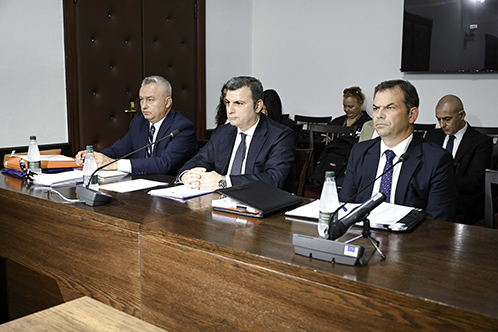
The Bank of Albania, in accordance with the provisions laid down in the Law No. 9662, dated 18.12.2006 "On banks in the Republic of Albania", as amended, and Law No. 52/2016, dated 19.05.2016 "On Savings and Loan Association and their Unions", grants the license to the following entities to carry out the lending activity:
- Banks – (11) which collect deposits from clients and may supply the entire gamma of credit products (credits with instalments, credit lines, financial leasing, micro credit, consumer credit, guarantees, letter of credit, etc.).
- Non-bank financial institutions - (26) which are not allowed to collect deposits from clients, bur are specialised in one or some lending activities (financial leasing, credits, micro credit, factoring, etc.).
- Savings and Loan Associations - (16) which collect deposits from their members and supply credits only to the members of the association.
These financial entities (banks and non-banks) have continuously supported the economy of Albania and households through lending activity. Currently, the entire granted credit portfolio is assessed at ALL 805 billion.
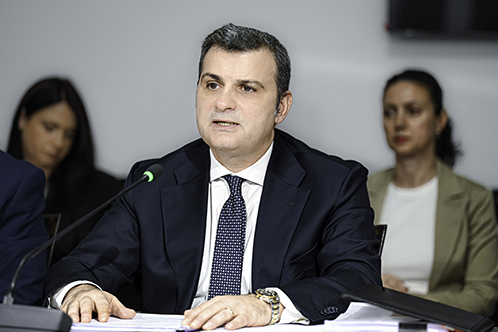
Lending is the main activity carried out by non-bank financial institutions. The latter through this activity help a specific category of consumers and small enterprises, who do not manage to access the banking system. Currently, 26 non-bank financial institutions operate in Albania carrying out the lending activity, though they account for only 6% of the system's credit portfolio, totalling All 53.6 billion.
The practice of selling and purchasing non-performing loans appeared in the Albanian financial market, after the global financial crisis of 2008-2010.
In this period, some of credits granted by banks over the years were not repaid by citizens. In 2015, these credits exceeded 25% of total credits, directly affecting the soundness and safety of banks and turning into a serious threat to citizens' savings. The ability of banking sector to support the economy with new credits reduces significantly due to the overloading of balance sheets with non-performing loans.
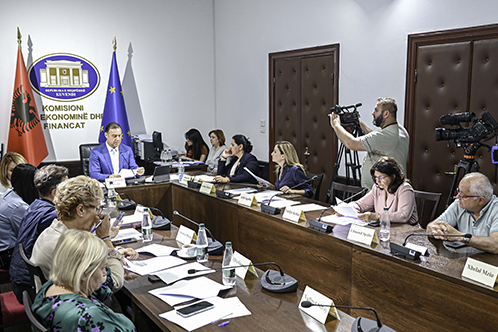
Against this backdrop, the Albanian Government and the Bank of Albania adopted “The National Plan on the Reduction of Non-performing loans” in September 2015. Among other things, the Plan charged the Bank of Albania with the task of regulating and licensing entities engaged in the purchase of non-performing loans. This practice, recognized internationally, is strongly recommended by the experts of the IMF and the World Bank.
In that period, some financial institutions, in addition to lending for which they were licensed by the Bank of Albania, had also purchased non-performing loan portfolios from banks. This activity is based on the provisions laid down in the Civil Code on the transfer of credit (Articles 499 – 507 and 705, respectively).
Pursuant to the amendments taking place in March 2016, credit purchase is considered a form of lending. Through licensing, credit purchase and sale, based on the aforementioned Articles of the Civil Code, is regulated and controlled by the Bank of Albania, being a subject to all supervisory obligations, including: reporting to the Credit Registry, providing periodic reports, risk management through on-site inspections, off-site analyses and ongoing supervision.
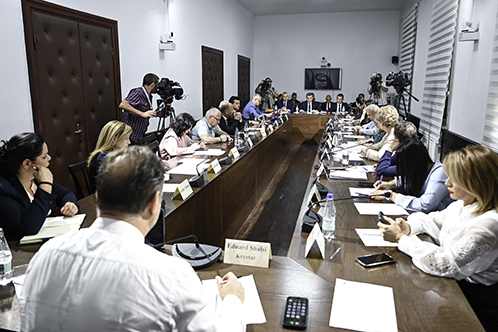
All banks were informed that upon this regulatory amendment, the process of collecting non-performing loans is part of the lending process and, as such, can only be carried out by entities being granted a license by the Bank of Albania.
Currently, there are 5 entities, which, in addition to lending activity, also carry out the activity of purchasing non-performing loans portfolios.
The further commercial relationships between banks and these institutions, regarding the sale and purchase of non-performing loans portfolio, are not a competence of the Bank of Albania. They are regulated by the Civil Code through contracts agreed between the parties.
In the following years, the expansion of this sector was also accompanied by the further improvement of the legal and regulatory framework. New and improved requirements are approved for the licensing and provisioning of purchased credits, consumer protection and ethics in granting and managing loans in the system. In concrete terms, the Bank of Albania:
- limited the penalties applied to the borrower of a consumer credit to the extent of 30% of the unpaid credit balance. This came as a necessity, given that the accumulated penalties for non-performing loans can exceed the credit principal several times;
- limited the interest rates on consumer credits, by adopting the concept of "maximum EIR" as an upper limit for the effective interest rates. This amendments aims to strengthen consumer protection against high credit costs, divided into interests, commissions and fees.
In addition, aimed at providing transparency and client protection, the following updates have taken place:
- Regulation No. 59, dated 29.08.2008 “On transparency for banking and financial products and services”, which lays down the requirements on the manner and form of providing information to clients on banking and financial products and services offered by the entities which fall under the scope of application of this Regulation;
- Regulation No. 48, dated 01.07.2015 “On consumer credits and mortgage credits”.
Currently, after the imposition of these restrictions, the average effective interest rate applied by non-bank financial institutions (which includes interest, commissions and any other type of fee applied to consumer loans), has been reduced by 3 times, compared to the period before the entry into force. Meanwhile, we emphasise that according to the implemented formula, the trend will always continue to be downward.
From the moment of being granted a license, all these entities have been regularly subject to continuous on-site inspections, off-site analyses and 3-month monitoring of financial statements and indicators from the Bank of Albania.
The scope of supervision encompassed every aspect of the activity of the entities that is included within the legal duties and powers of the Bank of Albania, which are regularly exerted to each financial entity under its supervision, banks and non-banks.
In concrete terms, the MCA entity has undergone, in a regular manner, has been subject of all the above inspections conducted by the Bank of Albania. To address the identified deficiencies, the entity was given a number of recommendations for follow-up. In 2022, after ascertaining that the recommendations had not been implemented and the problems had not been sufficiently addressed, the Bank of Albania escalated the measures on this entity by suspending the conduction of lending activity (including the purchase of new loans), for which it was licensed.
In the last inspection (December 2023), the Bank of Albania took a more severe measure, which although classified as a suspension, placed the MCA under the conditions of a "de facto revocation" of the license. Thus, the MCA was prohibited from carrying out the activities for which it was granted the licence. It was only allowed to sell the portfolio it managed to entities which are licensed and supervised by the Bank of Albania, as well as the immediate reflection in reduced liabilities, of any repayment carried out by the client.
The suspension and revocation of the license are the most severe administrative measures that the Bank of Albania can take in event of concluding any infringement, while carrying out the supervision function. The suspension limits the financial activities that the licensed entity can carry out, until the infringements are corrected, or the recommendations are fulfilled. Revocation definitively prohibits the entity from carrying out activities for which it is being granted a license.
Revocation of license is the last measure applied to an entity, as this measure automatically takes the entity out of the supervisory jurisdiction of the Bank of Albania, as it weigh on the borrowers’ situation for several reasons:
First, the revocation does not release the borrowers from the repayment of their liabilities; these liabilities constitute executive titles and, as such, are subject to mandatory execution procedures by the bailiff service, even after the license has been revoked.
Second, the revocation of the license makes it impossible for the Bank of Albania to address complaints of clients against these entities, which are no longer supervised and therefore no longer report to the Bank of Albania.
Third, the revocation interrupts both any reporting of these entities in the Credit Registry and any communication with the Bank of Albania. Even in case of full repayment of the loan to the entity, the status of borrowers would remain not updated in the Credit Registry, placing them unfairly in a penalized status.
Finally, the revocation of the license creates a false expectation among borrowers that through the cessation of the entity’s lending activity, the obligation to repay the loan is extinguished. Borrowers may perceive that non-payment of liabilities exists as an option. This drives to an increase in non-performing loans in the banking system, and puts citizens' savings at risk, and consequently, jeopardises the financial stability in Albania.
For all these reasons, the suspension of the license and the determination of a deadline for the sale of the portfolio to any other licensed entity, aims to protect borrowers from abusive practices and the problems mentioned above.
Currently, MCA has 15,942 borrowers in its portfolio. Of these, around 90% have received a court decision and/or are in the enforcement process. This means that for 90% of cases there is a court decision that determines the value of the borrower's liability. In total, MCA has purchased portfolios amounting ALL 9.6 billion, of which about 10% has been recovered.
Since the moment of licensing, until today (2016-2024), around 85 complaints against this entity have been submitted and handled in the Bank of Albania. The Bank of Albania has paid the maximum attention to the complaints and has addressed all of them, with no exception, in accordance and in full compliance with the legal and regulatory framework of the institution.
Complaints related with the enforcement execution process from the bailiff service have the main share within the number of the submitted complaints. This process is also a concern for the operational management of banks due to the quite high number of seizure orders that are filed every day by the bailiff service and that impose the blocking of debtors' accounts in unreasonable terms.
The organic law on the Bank of Albania clearly define its mandate, for the purposes of safeguarding the financial stability of Albania, authorizes the Bank of Albania to regulate, license and supervise entities that are part of the financial market, only within the categories as provided in the Law.
The activity of bailiff service is neither licensed nor supervised by the Bank of Albania. The legal framework does not give the Bank of Albania the competence to order the prohibition/suspension of the enforcement execution processes, nor to monitor the financial burden that this service pose on citizens. The law empowers this competence only to the court. Thus, the activity of bailiff service is not subject to control by the Bank of Albania.
In this context, we underscore that the legal authority of the Bank of Albania ends by the moment the court issues the execution order to recover the unpaid loan. Any process beyond this moment (auctions, imposition of seizures or any other procedural action undertaken by the bailiff companies) is out of the legal competences of the Bank of Albania and cannot be followed or regulated by it.
The Bank of Albania cannot even interfere in the relations that MCA has with the entities it contracts, such as the case of the bailiff service.
According to the provisions provided in the Civil Code, all contractual relationships are agreed upon the free will between the parties and the disputes that may arise during the execution of contractual obligations, fall under the jurisdiction of courts.
Likewise, Article 36 of the Civil Procedure Code stipulates that no other institution has the right to accept for consideration a civil dispute which is being tried by the court.
However, the Bank of Albania has been attentive to the problems that accompanied this part of the process, despite being beyond its jurisdiction. For the purposes of resolving them, the Bank of Albania has communicated regularly with the Ministry of Justice and has reported, whenever requested, to the Parliament of Albania. These issues have been dealt continuously with the National Chamber of Bailiffs, as well as with the Albanian Association of Banks.
In addition to the above, the Bank of Albania has continuously suggested coordinated actions for a substantial improvement of this entire process. These actions, by their very nature, require the involvement of other parties as well.
Specifically, we consider that it is necessary to make amendments to:
- The Code of Civil Procedure for the regulation of all procedural actions of bailiffs during the execution of executive titles;
- Drafting, in cooperation with the World Bank, of a special Law for consumer protection in the activity of non-bank financial institutions;
- The translation into laws of the regulatory amendments undertaken by the Bank of Albania, on the establishment of ceilings regarding penalties and interest rates;
- The transformation of all non-bank financial institutions into joint stock companies, aimed at increasing internal control and the organisation in two-tier management structure; and
- Accounting registration of only principal and interest in case of purchasing portfolios, at least until the determination of legal interest rate ceilings.
Concluding, we highlight that the Bank of Albania has acted, at all times, in full compliance with the obligations recognized by the law and remains always ready to make full transparency to the public, public institutions and the media in relation to its regulatory and supervisory activity.
Thank you!

 Linkedin
Linkedin
 Twitter
Twitter
 Youtube
Youtube
 Facebook
Facebook
 Flickr
Flickr
 RSS
RSS
 Subscribe
Subscribe
 Feedback
Feedback